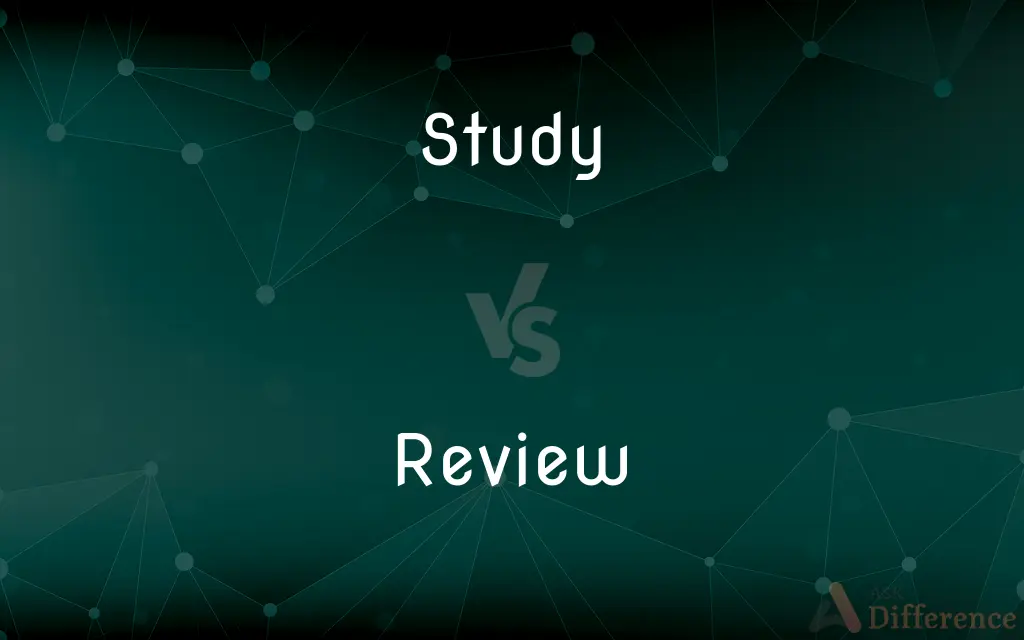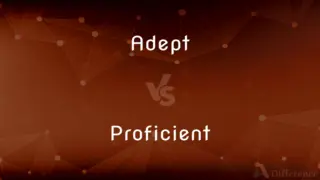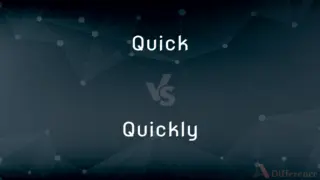Study vs. Review — What's the Difference?
By Urooj Arif & Fiza Rafique — Updated on March 1, 2024
Study involves in-depth learning and understanding of a subject, while review is revisiting previously learned material to reinforce knowledge or evaluate its comprehension.

Difference Between Study and Review
Table of Contents
ADVERTISEMENT
Key Differences
Studying is the process of actively engaging with new information or concepts to gain a deeper understanding or acquire new knowledge. It's a comprehensive approach that often involves reading, note-taking, practice, and application to fully grasp a subject matter. Reviewing, on the other hand, focuses on going over material that has already been learned. The purpose of a review can be to reinforce memory, ensure retention, or prepare for an assessment.
When someone studies, they are typically trying to learn something for the first time or expand their understanding of a topic. Reviewing is crucial for solidifying one's grasp on a topic, making connections between concepts, and identifying any areas that might need further study.
Both studying and reviewing are essential parts of the learning process, they serve different functions. Studying is about the acquisition and comprehension of new information, building the foundation of knowledge. Reviewing is about retention and comprehension check, ensuring that the information becomes a permanent part of one’s understanding.
The choice between studying and reviewing depends on the individual's familiarity with the subject and the objective of their learning process. For instance, ahead of an exam, students might study new chapters they haven't learned yet and review older ones to ensure a comprehensive understanding. This dynamic approach to learning helps in creating a well-rounded and effective study plan.
Comparison Chart
Purpose
To learn or understand new information.
To reinforce or evaluate previously learned information.
ADVERTISEMENT
Activities
Reading, note-taking, practicing new skills.
Going over notes, summarizing, testing knowledge.
Focus
Acquisition of knowledge.
Retention and comprehension check.
Timing
Primarily before mastering a subject.
After initial learning, often before assessments.
Outcome
Broad understanding and new knowledge.
Reinforced memory and better comprehension.
Compare with Definitions
Study
Engaging with material to gain a deeper understanding.
He studies the manual carefully to operate the machine.
Review
Assessing previously learned skills or knowledge.
They review past projects to learn from their mistakes.
Study
Learning a skill through practice.
He studies piano every day to improve.
Review
Revisiting learned material to reinforce memory.
She reviews her notes every evening after classes.
Study
A systematic approach to acquire knowledge.
They study ancient history for their research project.
Review
Evaluating comprehension of a topic.
He reviews the chapter to ensure he understands before moving on.
Study
Preparing for academic or professional exams.
She spends hours studying for her law exams.
Review
A method to keep information fresh.
Regular review helps her remember complex formulas.
Study
The devotion of time and attention to gaining knowledge of an academic subject, especially by means of books
An application to continue full-time study
The study of English
Review
Preparing for tests by going over key concepts.
They hold a review session before the final exam.
Study
Make an effort to achieve (a result) or take into account (a person or their wishes)
With no husband to study, housekeeping is mere play
Review
A review is an evaluation of a publication, service, or company such as a movie (a movie review), video game (video game review), musical composition (music review of a composition or recording), book (book review); a piece of hardware like a car, home appliance, or computer; or softwares such as business software, sales softwares; or an event or performance, such as a live music concert, play, musical theater show, dance show or art exhibition. In addition to a critical evaluation, the review's author may assign the work a rating to indicate its relative merit.
Study
The effort to acquire knowledge, as by reading, observation, or research
The study of language has overturned many misconceptions.
Review
To look over, study, or examine again
Reviewed last week's lesson.
Study
A branch of knowledge or department of learning
The study of geography.
Graduate studies.
Review
To consider retrospectively; look back on
Reviewed the day's events.
Study
To perform a study of; investigate
We need to study the problem further.
Review
To examine with an eye to criticism or correction
Reviewed the research findings.
Study
To apply oneself to learning, especially by reading
Studied for the exam.
Review
To write or give a critical report on (a new work or performance, for example).
Study
Applying the mind to learning and understanding a subject (especially by reading);
Mastering a second language requires a lot of work
No schools offer graduate study in interior design
Review
A retrospective view or survey.
Study
A branch of knowledge;
In what discipline is his doctorate?
Teachers should be well trained in their subject
Anthropology is the study of human beings
Review
To view or see again; to look back on.
Study
Someone who memorizes quickly and easily (as the lines for a part in a play);
He is a quick study
Review
Look at again; examine again;
Let's review your situation
Study
Think intently and at length, as for spiritual purposes;
He is meditating in his study
Review
Appraise critically;
She reviews books for the New York Times
Please critique this performance
Study
The act of learning about a new subject or concept.
She studies biology to become a doctor.
Review
Look back upon (a period of time, sequence of events, etc.); remember;
She reviewed her achievements with pride
Common Curiosities
How often should one review learned material?
The frequency can vary, but regular intervals, such as daily or weekly, are effective for long-term retention.
How can technology aid in studying and reviewing?
Technology offers various tools, like flashcards, educational apps, and online quizzes, for both learning new material and reviewing.
Can reviewing be considered a part of studying?
Yes, reviewing is an essential component of the studying process, aiding in retention and understanding.
Is it better to study or review before an exam?
Both are important; studying is crucial for understanding new material, while reviewing helps solidify knowledge and prepare for the exam.
Why is it necessary to review even if I study regularly?
Reviewing ensures that information is retained and understood over time, preventing forgetting and deepening comprehension.
What are some effective strategies for reviewing?
Summarizing notes, using flashcards, self-testing, and group study sessions are effective for reviewing.
What is the main difference between studying and reviewing?
Studying is about learning new information, while reviewing is about reinforcing what has already been learned.
Can review sessions replace studying?
No, review sessions cannot replace studying, as they serve different purposes in the learning process.
What are some effective strategies for studying?
Effective strategies include active note-taking, teaching others, applying concepts to real-life situations, and spaced repetition.
How does one balance between studying and reviewing?
Balancing involves allocating time based on familiarity with the material, upcoming assessments, and personal learning needs.
How do mood and environment affect studying and reviewing?
A positive mood and a conducive environment can significantly enhance focus and retention during both studying and reviewing sessions.
How do studying and reviewing contribute to academic success?
Together, they ensure both the acquisition of new knowledge and the retention of previously learned information, crucial for academic achievement.
Is group studying or reviewing more effective?
This depends on personal preference; some find group sessions helpful for discussion and clarification, while others prefer solo study for concentration.
What role does repetition play in studying and reviewing?
Repetition is key to moving information from short-term to long-term memory, making it crucial for both studying and reviewing.
Can studying and reviewing improve problem-solving skills?
Yes, as they enhance understanding and recall, providing a solid knowledge base to apply to problem-solving.
Share Your Discovery

Previous Comparison
Adept vs. Proficient
Next Comparison
Quick vs. QuicklyAuthor Spotlight
Written by
Urooj ArifUrooj is a skilled content writer at Ask Difference, known for her exceptional ability to simplify complex topics into engaging and informative content. With a passion for research and a flair for clear, concise writing, she consistently delivers articles that resonate with our diverse audience.
Co-written by
Fiza RafiqueFiza Rafique is a skilled content writer at AskDifference.com, where she meticulously refines and enhances written pieces. Drawing from her vast editorial expertise, Fiza ensures clarity, accuracy, and precision in every article. Passionate about language, she continually seeks to elevate the quality of content for readers worldwide.














































